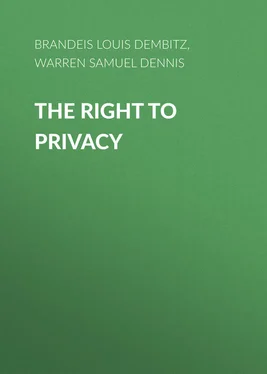Louis Brandeis - The Right to Privacy
Здесь есть возможность читать онлайн «Louis Brandeis - The Right to Privacy» — ознакомительный отрывок электронной книги совершенно бесплатно, а после прочтения отрывка купить полную версию. В некоторых случаях можно слушать аудио, скачать через торрент в формате fb2 и присутствует краткое содержание. Жанр: foreign_antique, foreign_prose, на английском языке. Описание произведения, (предисловие) а так же отзывы посетителей доступны на портале библиотеки ЛибКат.
- Название:The Right to Privacy
- Автор:
- Жанр:
- Год:неизвестен
- ISBN:нет данных
- Рейтинг книги:5 / 5. Голосов: 1
-
Избранное:Добавить в избранное
- Отзывы:
-
Ваша оценка:
- 100
- 1
- 2
- 3
- 4
- 5
The Right to Privacy: краткое содержание, описание и аннотация
Предлагаем к чтению аннотацию, описание, краткое содержание или предисловие (зависит от того, что написал сам автор книги «The Right to Privacy»). Если вы не нашли необходимую информацию о книге — напишите в комментариях, мы постараемся отыскать её.
The Right to Privacy — читать онлайн ознакомительный отрывок
Ниже представлен текст книги, разбитый по страницам. Система сохранения места последней прочитанной страницы, позволяет с удобством читать онлайн бесплатно книгу «The Right to Privacy», без необходимости каждый раз заново искать на чём Вы остановились. Поставьте закладку, и сможете в любой момент перейти на страницу, на которой закончили чтение.
Интервал:
Закладка:
Of the desirability – indeed of the necessity – of some such protection, there can, it is believed, be no doubt. The press is overstepping in every direction the obvious bounds of propriety and of decency. Gossip is no longer the resource of the idle and of the vicious, but has become a trade, which is pursued with industry as well as effrontery. To satisfy a prurient taste the details of sexual relations are spread broadcast in the columns of the daily papers. To occupy the indolent, column upon column is filled with idle gossip, which can only be procured by intrusion upon the domestic circle. The intensity and complexity of life, attendant upon advancing civilization, have rendered necessary some retreat from the world, and man, under the refining influence of culture, has become more sensitive to publicity, so that solitude and privacy have become more essential to the individual; but modern enterprise and invention have, through invasions upon his privacy, subjected him to mental pain and distress, far greater than could be inflicted by mere bodily injury. Nor is the harm wrought by such invasions confined to the suffering of those who may be made the subjects of journalistic or other enterprise. In this, as in other branches of commerce, the supply creates the demand. Each crop of unseemly gossip, thus harvested, becomes the seed of more, and, in direct proportion to its circulation, results in a lowering of social standards and of morality. Even gossip apparently harmless, when widely and persistently circulated, is potent for evil. It both belittles and perverts. It belittles by inverting the relative importance of things, thus dwarfing the thoughts and aspirations of a people. When personal gossip attains the dignity of print, and crowds the space available for matters of real interest to the community, what wonder that the ignorant and thoughtless mistake its relative importance. Easy of comprehension, appealing to that weak side of human nature which is never wholly cast down by the misfortunes and frailties of our neighbors, no one can be surprised that it usurps the place of interest in brains capable of other things. Triviality destroys at once robustness of thought and delicacy of feeling. No enthusiasm can flourish, no generous impulse can survive under its blighting influence.
It is our purpose to consider whether the existing law affords a principle which can properly be invoked to protect the privacy of the individual; and, if it does, what the nature and extent of such protection is.
Owing to the nature of the instruments by which privacy is invaded, the injury inflicted bears a superficial resemblance to the wrongs dealt with by the law of slander and of libel, while a legal remedy for such injury seems to involve the treatment of mere wounded feelings, as a substantive cause of action. The principle on which the law of defamation rests, covers, however, a radically different class of effects from those for which attention is now asked. It deals only with damage to reputation, with the injury done to the individual in his external relations to the community, by lowering him in the estimation of his fellows. The matter published of him, however widely circulated, and however unsuited to publicity, must, in order to be actionable, have a direct tendency to injure him in his intercourse with others, and even if in writing or in print, must subject him to the hatred, ridicule, or contempt of his fellow-men, – the effect of the publication upon his estimate of himself and upon his own feelings not forming an essential element in the cause of action. In short, the wrongs and correlative rights recognized by the law of slander and libel are in their nature material rather than spiritual. That branch of the law simply extends the protection surrounding physical property to certain of the conditions necessary or helpful to worldly prosperity. On the other hand, our law recognizes no principle upon which compensation can be granted for mere injury to the feelings. However painful the mental effects upon another of an act, though purely wanton or even malicious, yet if the act itself is otherwise lawful, the suffering inflicted is damnum absque injuria . Injury of feelings may indeed be taken account of in ascertaining the amount of damages when attending what is recognized as a legal injury; 14 14 Though the legal value of "feelings" is now generally recognized, distinctions have been drawn between the several classes of cases in which compensation may or may not be recovered. Thus, the fright occasioned by an assault constitutes a cause of action, but fright occasioned by negligence does not. So fright coupled with bodily injury affords a foundation for enhanced damages; but, ordinarily, fright unattended by bodily injury cannot be relied upon as an element of damages, even where a valid cause of action exists, as in trespass quare clausum fregit . Wyman v. Leavitt, 71 Me. 227; Canning v. Williamstown, 1 Cush. 451. The allowance of damages for injury to the parents' feelings, in case of seduction, abduction of a child (Stowe v. Heywood, 7 All. 118), or removal of the corpse of child from a burial-ground (Meagher v. Driscoll, 99 Mass. 281), are said to be exceptions to a general rule. On the other hand, injury to feelings is a recognized element of damages in actions of slander and libel, and of malicious prosecution. These distinctions between the cases, where injury to feelings does and where it does not constitute a cause of action or legal element of damages, are not logical, but doubtless serve well as practical rules. It will, it is believed, be found, upon examination of the authorities, that wherever substantial mental suffering would be the natural and probable result of the act, there compensation for injury to feelings has been allowed, and that where no mental suffering would ordinarily result, or if resulting, would naturally be but trifling, and, being unaccompanied by visible signs of injury, would afford a wide scope for imaginative ills, there damages have been disallowed. The decisions on this subject illustrate well the subjection in our law of logic to common-sense.
but our system, unlike the Roman law, does not afford a remedy even for mental suffering which results from mere contumely and insult, from an intentional and unwarranted violation of the "honor" of another. 15 15 "Injuria, in the narrower sense, is every intentional and illegal violation of honour, i. e. , the whole personality of another." "Now an outrage is committed not only when a man shall be struck with the fist, say, or with a club, or even flogged, but also if abusive language has been used to one." Salkowski, Roman Law, p. 668 and p. 669, n. 2.
It is not however necessary, in order to sustain the view that the common law recognizes and upholds a principle applicable to cases of invasion of privacy, to invoke the analogy, which is but superficial, to injuries sustained, either by an attack upon reputation or by what the civilians called a violation of honor; for the legal doctrines relating to infractions of what is ordinarily termed the common-law right to intellectual and artistic property are, it is believed, but instances and applications of a general right to privacy, which properly understood afford a remedy for the evils under consideration.
The common law secures to each individual the right of determining, ordinarily, to what extent his thoughts, sentiments, and emotions shall be communicated to others. 16 16 "It is certain every man has a right to keep his own sentiments, if he pleases. He has certainly a right to judge whether he will make them public, or commit them only to the sight of his friends." Yates, J., in Millar v. Taylor, 4 Burr. 2303, 2379 (1769).
Under our system of government, he can never be compelled to express them (except when upon the witness-stand); and even if he has chosen to give them expression, he generally retains the power to fix the limits of the publicity which shall be given them. The existence of this right does not depend upon the particular method of expression adopted. It is immaterial whether it be by word 17 17 Nicols v. Pitman, 26 Ch. D. 374 (1884).
or by signs, 18 18 Lee v. Simpson, 3 C. B. 871, 881; Daly v. Palmer, 6 Blatchf. 256.
in painting, 19 19 Turner v. Robinson, 10 Ir. Ch. 121; s. c. ib. 510.
by sculpture, or in music. 20 20 Drone on Copyright, 102.
Neither does the existence of the right depend upon the nature or value of the thought or emotion, nor upon the excellence of the means of expression. 21 21 "Assuming the law to be so, what is its foundation in this respect? It is not, I conceive, referable to any consideration peculiarly literary. Those with whom our common law originated had not probably among their many merits that of being patrons of letters; but they knew the duty and necessity of protecting property, and with that general object laid down rules providently expansive, – rules capable of adapting themselves to the various forms and modes of property which peace and cultivation might discover and introduce. "The produce of mental labor, thoughts and sentiments, recorded and preserved by writing, became, as knowledge went onward and spread, and the culture of man's understanding advanced, a kind of property impossible to disregard, and the interference of modern legislation upon the subject, by the stat. 8 Anne, professing by its title to be 'For the encouragement of learning,' and using the words 'taken the liberty,' in the preamble, whether it operated in augmentation or diminution of the private rights of authors, having left them to some extent untouched, it was found that the common law, in providing for the protection of property, provided for their security, at least before general publication by the writer's consent." Knight Bruce, V. C., in Prince Albert v. Strange, 2 DeGex & Sm. 652, 695 (1849).
The same protection is accorded to a casual letter or an entry in a diary and to the most valuable poem or essay, to a botch or daub and to a masterpiece. In every such case the individual is entitled to decide whether that which is his shall be given to the public. 22 22 "The question, however, does not turn upon the form or amount of mischief or advantage, loss or gain. The author of manuscripts, whether he is famous or obscure, low or high, has a right to say of them, if innocent, that whether interesting or dull, light or heavy, saleable or unsaleable, they shall not, without his consent, be published." Knight Bruce, V. C., in Prince Albert v. Strange, 2 DeGex & Sm. 652, 694.
No other has the right to publish his productions in any form, without his consent. This right is wholly independent of the material on which, or the means by which, the thought, sentiment, or emotion is expressed. It may exist independently of any corporeal being, as in words spoken, a song sung, a drama acted. Or if expressed on any material, as a poem in writing, the author may have parted with the paper, without forfeiting any proprietary right in the composition itself. The right is lost only when the author himself communicates his production to the public, – in other words, publishes it. 23 23 Duke of Queensberry v. Shebbeare, 2 Eden, 329 (1758); Bartlett v. Crittenden, 5 McLean, 32, 41 (1849).
It is entirely independent of the copyright laws, and their extension into the domain of art. The aim of those statutes is to secure to the author, composer, or artist the entire profits arising from publication; but the common-law protection enables him to control absolutely the act of publication, and in the exercise of his own discretion, to decide whether there shall be any publication at all. 24 24 Drone on Copyright, pp. 102, 104; Parton v. Prang, 3 Clifford, 537, 548 (1872); Jefferys v. Boosey, 4 H. L. C. 815, 867, 962 (1854).
The statutory right is of no value, unless there is a publication; the common-law right is lost as soon as there is a publication.
Интервал:
Закладка:
Похожие книги на «The Right to Privacy»
Представляем Вашему вниманию похожие книги на «The Right to Privacy» списком для выбора. Мы отобрали схожую по названию и смыслу литературу в надежде предоставить читателям больше вариантов отыскать новые, интересные, ещё непрочитанные произведения.
Обсуждение, отзывы о книге «The Right to Privacy» и просто собственные мнения читателей. Оставьте ваши комментарии, напишите, что Вы думаете о произведении, его смысле или главных героях. Укажите что конкретно понравилось, а что нет, и почему Вы так считаете.












